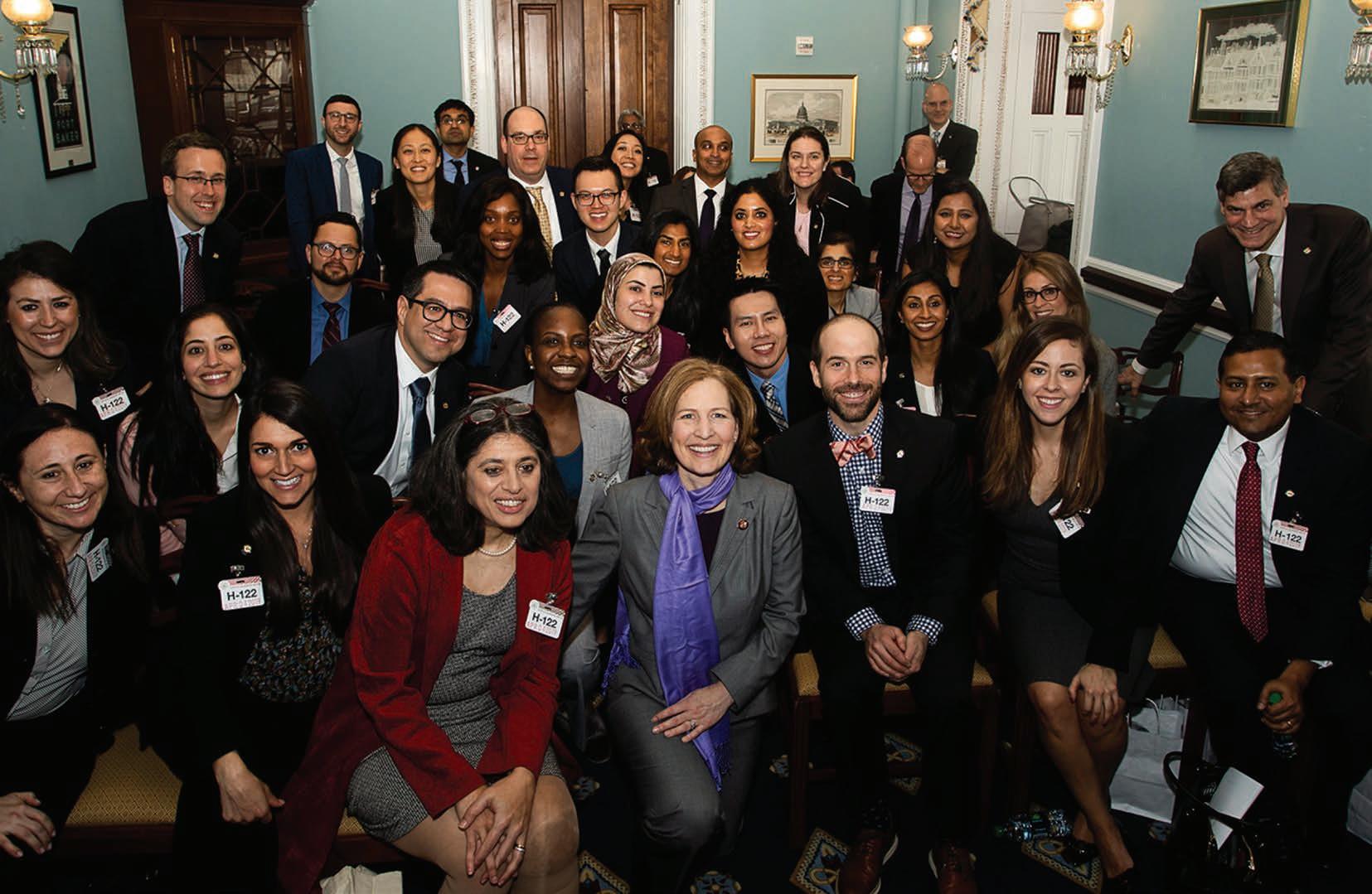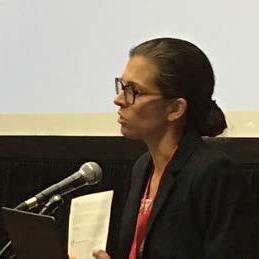PERSPECTIVE: Incoming Class of Junior Faculty Awardees ACG’s 2020 Junior Faculty Development Awardees Share Thoughts on Their Research and Career Focus Patricia Bloom, MD
my research objectives. These skills will allow me to move towards independence in conducting high-quality research on microbiome-based interventions for chronic liver disease. The important data generated from this project will serve as the basis of future projects and funding.
Kimberly N. Harer, MD, ScM University of Michigan
Development of a Patient Reported Outcome Measure (PROM) to Identify Avoidant/ Restrictive Food Intake Disorder (ARFID) in Adult Gastroenterology Patients
University of Michigan Fecal Microbiota Transplant for the Treatment of Hepatic Encephalopathy
This year I am joining the faculty of the University of Michigan as a transplant hepatologist. I am a clinical investigator studying the connection between the intestinal microbiome and complications of cirrhosis. I completed my internal medicine residency, my GI fellowship, and my advanced transplant hepatology fellowship at Massachusetts General Hospital (2013-2020), and have additional training in epidemiology and biostatistics from the Harvard T.H. Chan School of Public Health (2017). With generous support from the ACG Junior Faculty Development Award, I will complete a project to determine if oral fecal microbiota transplant (FMT) capsules can improve the intestinal dysbiosis in cirrhotic patients and treat hepatic encephalopathy. My first aim is to assess the efficacy and safety of oral FMT capsules from previously efficacious donors to improve ongoing cognitive dysfunction and intestinal dysbiosis in cirrhotic patients with a history of overt hepatic encephalopathy. The second aim is to identify the species and functional pathways of the fecal microbiome associated with improvement in cognitive function after FMT in cirrhotic patients with a history of hepatic encephalopathy. Ultimately, my long-term goals are to identify the mechanistic pathways underpinning this data, and to create next generation microbiome-based therapies for the treatment of cirrhotic complications, tailored to the disease state. In the challenging times of the COVID-19 pandemic, the ACG Junior Faculty Development Award has provided the certainty of knowing that my time and energy can continue to focus on advancing research for this group of patients, who desperately need a revolution in their care. Hepatic encephalopathy continues to wreak havoc on the lives of patients and available treatments are far from perfect. With this support from the ACG, the current proposal will build on my strong foundation, while simultaneously developing important new techniques and skills to achieve
10 | 2019–2020 Annual Report of Programs & Activities
I am a Clinical Lecturer in the Division of Gastroenterology and Hepatology at the University of Michigan. During my gastroenterology fellowship at Johns Hopkins, which included a T32 grant and completion of a Master of Science in Clinical Investigation degree, I had the pleasure of working with a mentor, Dr. Jay Pasricha, in the multi-disciplinary Food, Body, and Mind Clinic. This experience sparked my passion for understanding the complex GI and psychological processes contributing to patients’ disordered eating patterns and malnutrition. I then had the opportunity to join the University of Michigan faculty and work with a team of gastroenterology and psychogastroenterology mentors, including Drs. William Chey and Megan Riehl, who continued to foster my desire to investigate how Avoidant/Restrictive Food Intake Disorder (ARFID) complicates the clinical presentation of GI patients. Among adult GI patients, ARFID is most often associated with a fear of negative consequences, and patients often describe this phenomenon as “food PTSD.” To date, ARFID has largely gone unrecognized and undiagnosed in the GI population, which is primarily driven by the critical knowledge gap in how to differentiate normal, adaptive dietary restriction due to true negative side effects from food from maladaptive ARFID-driven restriction. The aim of this study is to provide clinicians with an accessible, robust, valid, and clinically meaningful Patient Reported Outcome Measure (PROM) to identify ARFID in the GI patient population and support clinical decision-making. The new PROM will directly improve patient care by assessing for ARFID behaviors and providing treatment guidance in an accessible, low cost, valid, and reliable way. This will be accomplished through rigorous scientific methodology (PROMIS standards) and utilization of both patient and clinician input throughout the development process. Aim 1 will develop a conceptual framework of ARFID and GI symptom-driven food avoidance symptoms and behaviors. Aim 2 will build an item pool of clinically relevant
items related to ARFID-driven and GI symptom-driven food avoidance. Aim 3 will field test the new PROM in a large sample of gastroenterology patients with diverse GI diagnoses and varying disease severity. This mentored research will lay the foundation for validation and pilot implementation of the new PROM as the focus of a K23 career award application. Ultimately, this new PROM will facilitate future research investigating ARFID therapy effectiveness for patients with a wide range of digestive disease disorders. My long-term goal is to establish myself as a national leader and independent researcher in the emerging field of psychogastroenterology, in particular focusing on: 1) integrating quantitative and qualitative approaches to evaluate the overlap of gastrointestinal and psychological symptoms and 2) developing and implementing multidisciplinary interventions to improve patient care.
Nadim Mahmud, MD, MS, MPH, MSCE
Hospital of the University of Pennsylvania Improving Surgical Risk Prediction in Patients With Cirrhosis
I am an Assistant Professor of Medicine and Epidemiology in the Division of Gastroenterology and Department of Biostatistics, Epidemiology, and Informatics at the University of Pennsylvania Perelman School of Medicine. My gastroenterology and advanced/ transplant hepatology fellowships, which included a T32 research training grant in clinical epidemiology, were both completed at the University of Pennsylvania. The motivation for this research project stems from clinical challenges in risk stratifying patients with cirrhosis for surgical procedures. Existing tools are either poorly calibrated or not designed to broadly predict cirrhosis surgical risk. In particular, no models consider the type of surgical procedure to be performed, which generally leads to overestimation of surgical risk and a culture of risk aversion. The first specific aim of the project is to derive, internally validate, and externally validate novel cirrhosis surgical risk models using granular population-level data and detailed surgical information. The team plans to incorporate differences in risk based on surgery type and indication, and to compare the new models against current clinical standards, such as the model for end-stage liver disease score and the Mayo surgical risk score. The second specific aim of this project is to use decision analysis methods to determine optimal clinical decisions for a common clinical scenario —acute cholecystitis. This is an important issue, as surgical risk must be weighed against non-surgical options in clinical practice.









